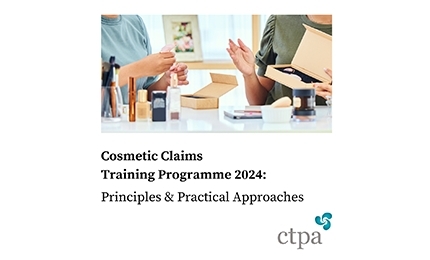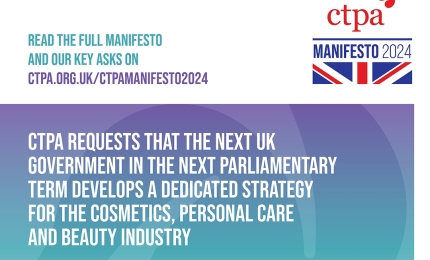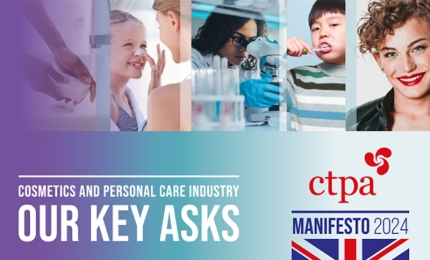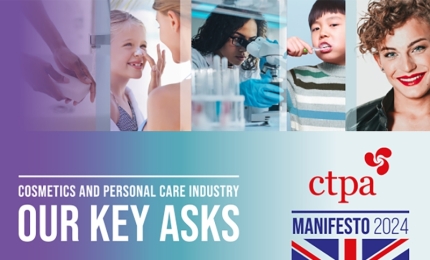Find us on...
John Chave, Director General of Cosmetics Europe, tells CTPA about its latest survey of European consumers and why people are placing such emphasis on their everyday essentials.
Tell us about the consumer survey you published recently? What were you looking to explore, and why?
In a nutshell, we wanted to explore what cosmetics and personal care products bring to people’s lives.
Our industry’s economic contribution is well established and well recognised. We’re an export driven industry that makes a huge financial contribution, and enjoys really strong SME representation, both in the UK and across Europe. This is incredibly important and it’s right we have a strong reputation for it. But it’s also just one way we contribute.
The products that we make also play a vital part in people’s personal health and wellbeing. That’s not a contribution to society that you can quantify in economic terms. But it matters profoundly to the millions who use our products daily, and yet is at odds with some perceptions of cosmetics as frivolous, superficial or dispensable. So that’s why we did this survey. To understand what cosmetic products mean to those who use them, and why.
Of course, Europe is a very diverse place, so to be truly representative of European consumers’ perceptions we needed to commission a very broad study. We canvassed more than 6,000 consumers right across Europe, and captured differences in age and gender demographics. It means that we can feel confident that we have a set of findings that truly ‘speak for Europe’.
Tell us about the findings. What was most notable?
Three main points really stood out for us, and they’re ones where we saw real synergies across different countries and age groups.
Firstly, the sheer range of products that people use on a daily basis. The research shows that people use an average of seven different products a day, and 13 different products a week. It really reinforces that our products are not just being used by everyone but being used in a very substantial way by everyone. In fact, it’s difficult to think of another consumer sector where so many different products are enjoyed daily.
The second point that stood out was the value consumers place on cosmetics and personal care products. Nearly three quarters of EU consumers (72%) said they see our products as ‘important’, or ‘very important’, in their daily lives. It’s a significant majority of people and a strong counter to any perception of our products as merely frivolous or dispensable.
Lastly, the positive role of products on self-esteem was a stand-out finding. A significant 70% of respondents stated that cosmetics were ‘important’, or ‘very important’, for building up their self-esteem. Meanwhile, ‘to feel good about themselves’ was cited as the second most popular reason for using cosmetics and toiletries, hot on the heels of ‘for personal hygiene’.
Why do you think people place so much importance on cosmetics products?
I believe it comes back to how products can make people feel, and the positive influence that that can have on their lives. Whoever you are and however you choose to live, you can be most effective when you are at ease with yourself. That’s why people think about the products they will use when they get up in the morning. Those products can help to put them in the best frame of mind to tackle the tasks of their day; whatever that day holds. This connection between products and positive mental health is pervasive through the survey findings, and rings true across countries, genders and ages.
Do you think more should be done to acknowledge the positive role of products in people’s lives?
There is growing recognition of the importance of people’s mental health right across Europe. Within this context, I think it’s hard to ignore the positive role that our products play. Cosmetics Europe is here to champion that fact on behalf of consumers and companies.
For example, our consumer survey findings offer compelling evidence about how essential our products are. Not just in an economic sense, as I mentioned previously, but to individuals’ mental outlook and everyday lives. We’ll be presenting this evidence to EU Regulators to inform the live - and lively - discussions they’re having about whether products and ingredients should be regulated on the basis of how essential they are to consumers.
What more can Cosmetics Europe do to protect the future of products that clearly mean so much to people?
Conversations with regulators are important, but Cosmetics Europe is also here to hold a mirror up to the industry, and while there’s proof our products support self-esteem, there are also valid concerns that some of our practices may not.
When we launched the consumer survey findings at our recent conference, Prof. Phillippa Diedrichs, PhD, Founder & Principal Consultant at Everybody Consulting, criticised the industry’s advertising model for perpetuating this idea that you have to be glamorous to enjoy cosmetic products. It’s an idea that’s misaligned with reality.
This is an important concern and one to take very seriously. The industry has made great strides in recent years to be more inclusive in the way it presents its products, but there’s still work to be done, and now with more urgency. If we’re making the case for the positive influence of the industry’s products, then companies must make sure that their marketing follows suit.
Lastly, there is a growing need to reassure consumers that they can enjoy the self-esteem boosting benefits of their cosmetic products without causing harm to the environment. The industry is investing heavily in a sustainable future, but companies and Cosmetics Europe must do more to promote these efforts, and also educate consumers about how they can play their part. When we all commit to doing the best by both people and the planet, then there’s a bright future ahead for cosmetics products: one where self-esteem and sustainability co-exist in harmony.
To find out more about Cosmetics Europe’s consumer survey visit: https://cosmeticseurope.eu/cosmetic-products/european-consumer-perception-study-2022/
About the consumer survey: The research for Cosmetics Europe was conducted by ifop. It interviewed 6033 consumers in 10 countries. All interviewees were 18+ and representative of each country’s gender and age group distribution. The countries included: France, Germany, UK, Netherlands, Italy, Spain, Poland, Bulgaria, Sweden and Denmark.












